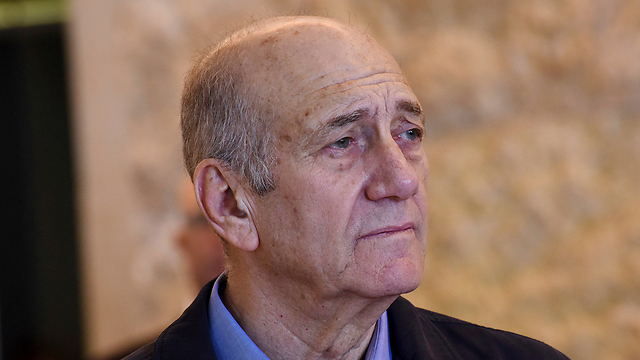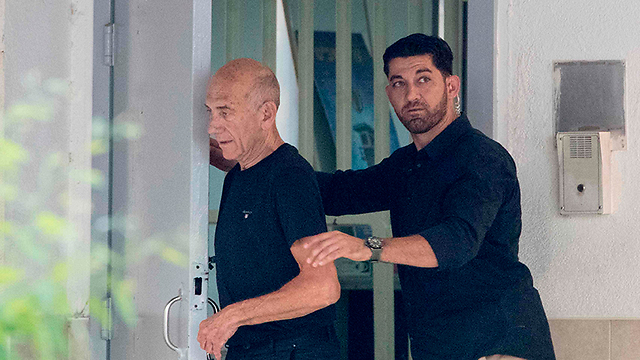
Israel's ex-PM Ehud Olmert released from prison, asks president to remove parole restrictions
Just hours after being released from prison Sunday morning, having served a third of his 27-month sentence for corruption convictions, Ehud Olmert appeals to the president in bid to remove all parole restrictions; 'We wish him success and happiness with his family,' says attorney.
Former Israeli prime minister Ehud Olmert appealed to the President’s Residence on Sunday seeking the removal of all terms and restrictions of his release just hours after leaving prison. Olmert was released the same morning after a parole board granted him early release from his 27-month corruption sentence.
The President’s Residence said that the request was being dealt with. As part of his parole terms, Olmert is forbidden from travelling abroad and is also required to turn up at the police station once per fortnight. He is also not permitted to give interviews.
As part of his rehabilitation, Olmert will attend psychological therapy weekly sessions with a social worker and will also volunteer twice per week with two different charities.
Spokesman Assaf Librati said Olmert, 71, was whisked away by Israel's security service after his release and driven home.
He added that President Reuven Rivlin could relieve him of the parole restrictions.
Olmert was convicted in 2014 in a wide-ranging case that accused him of accepting bribes to promote a real-estate project years in Jerusalem and obstructing justice. The charges pertained to a period when he was mayor of Jerusalem and trade minister before he became premier in 2006.
Olmert was originally sentenced to six years but he waged a relentless legal battle in his quest to reduce what some considered a harsh punishment.
Efforts paid off in December 2015 when the sentence was reduced to 18 months, but Olmert was then hit with an additional 8 months in September 2016 after Israel’s supreme court threw out his appeal.
His imprisonment ended the last major Israeli-Palestinian peace efforts and ushered in the era of Benjamin Netanyahu in 2009.
Olmert was a longtime fixture in Israel's right wing camp when he began taking a dramatically more conciliatory line toward the Palestinians more than a decade ago. He played a leading role in Israel's withdrawal from the Gaza Strip in 2005 and became prime minister in January 2006 after then-Prime Minister Ariel Sharon suffered a debilitating stroke.
He resigned amid a corruption scandal that clouded his administration. He was later charged, convicted and imprisoned.
A gifted orator, he led his government to the Annapolis peace conference in November 2007—launching more than a year of ambitious, but ultimately unsuccessful US-brokered peace talks.
Olmert has said he made unprecedented concessions to the Palestinians—including a near-total withdrawal from the West Bank and an offer to place Jerusalem's Old City under international control—and was close to reaching an agreement at the time of his resignation.













